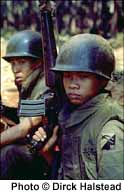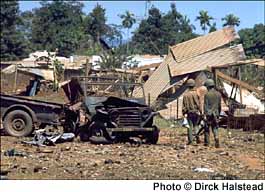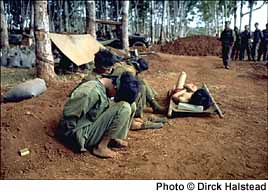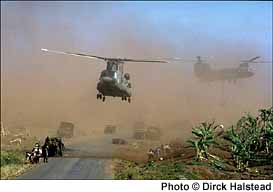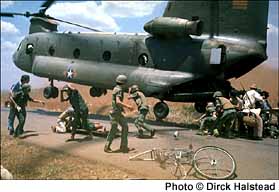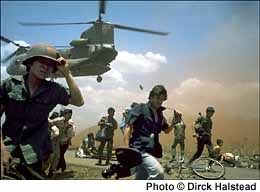APRIL 20 - HONG KONG AIRPORT I'm half in the bag from too much alcohol consumed in the first class section of my Pan Am clipper from New York, and punchy from the time zone change. Queuing up to the Air Vietnam counter to get my boarding pass for the flight to Saigon, I see a sign being posted, “All Flights to Saigon Canceled.” It turns out that Saigon is under air attack. It doesn't make any sense...The North Vietnamese have never flown a flight over Saigon during the war. Milling about the counter are the oddest bunch of travelers I have ever seen. Spaced-out hippies with weird lights in their eyes; soldiers of fortune with golf bags full of cargo that never would pass inspection; wealthy Hong Kong bankers carrying empty valises; and of course, photographers and reporters with whom I had ridden down many dusty roads over the years. It turned out that there had been a brief coup attempt, one of many that had occurred in the past few years. By early evening, our Air Vietnam Caravelle is descending through the tropical sunset, skimming over rice paddies, exposing the bends of the shimmering Mekong River to my eye as we drop into "The Paris Of The Orient." APRIL 21 - SAIGON, SOUTH VIETNAM I always forget how hot Saigon is. It's only 7 a.m., and already my shirt is sticking to my back as I climb the stairs to the TIME/LIFE bureau in the Continental Palace Hotel. The smells of freshly cooked "Pho," the beef soup that serves as breakfast, lunch and dinner for many of Saigon's residents fills my nostrils. It reminds me of just how much I love this place. I feel as though the past three years since my last visit have just evaporated...no presidents...no new beauties...just Saigon...just like always. I grab a key from its hiding place in the bureau, and walk to a small shed behind the U.S. Embassy. Opening the door, I see the bureau mini-moke, with its "BAO CHI/PRESS" sign taped to the windshield. Poking around in a corner, I come across my old combat bag. I spread the contents on the floor. Two sets of fatigues, jungle, tropical, with "Dirck Halstead, TIME/LIFE" sewn onto the blouse pockets; a pair of standard issue, jungle-tropical boots, with metal soles designed to withstand sharpened pongee stakes, but useless against a land mine; a Musette camera bag, still holding some long-since expired color film; a zipped baggie containing malaria pills, water-purifying tablets, a couple of old cool-aid packets, a bottle of Tabasco sauce, and a small half-bottle of Mekong whiskey; a couple of towels, covered with red dust; a web ammo belt with harness and two canteens; and on the bottom, my old helmet, still bearing the "BAO/CHI, UPI PHOTOS, HALSTEAD" letters. I forget where I first got the helmet. It was picked up on some long-forgotten battlefield. I think to myself, "God, it feels good to be home!" 0900 hours: I'm sitting at a table at the bar on the corner of Tudo Street , having a "cafe-soda," when I spy Leon Daniel, veteran UPI correspondent and an old friend. He yells at me that if I want to see some "bang-bang" I better get my camera. I pile into his car, and we speed toward Bien Hoa, a few miles up the highway from Saigon. He explains that the Army of The Republic of Vietnam (ARVN) has long since ceased allowing press to come along on any operations. Their military briefings have become less than worthless, but because of constant pressure from the American press, the Vietnamese Air Force (VNAF) has decided to run one helicopter lift to what appears to be the last stronghold of the South Vietnamese forces. In the preceding month, nearly all important South Vietnamese strong points have collapsed: First Ban Me Thout and Pleiku in the Central Highlands; then Hue, where nearly all the South Vietnamese Marines were trapped and destroyed on the beaches while awaiting naval evacuation; then DaNang, which had been the key American air base during the war; then Nhatrang; and now, as North Vietnamese forces rushed south down the highways, the only things holding them back are the inability of their tankers to keep pace with fuel demand, and one ragged ARVN battalion, the 18th Division, that is doing its best to hold the door to Saigon shut. It's one battalion against the combined weight of an overwhelming NVA military machine barreling down the road to Saigon....and that is exactly where we are going.
1100 hours - XUAN LOC OUTPOST, NORTH OF SAIGON Our aging Chinook helicopter kicks up a wall of red dust as it settles on a highway. Everywhere we look there are refugees, many of them have walked hundreds of miles to get to this point where they hope to find safety. ARVN wounded call from stretchers for a drink of water. Two jeeps barrel toward us and the drivers yell for us to get aboard, as incoming rocket rounds scream overhead. In his command tent, General Le Minh Dao whips his swagger stick against his neatly pressed fatigues. "We will hold this location," Dao barks into a field telephone in Vietnamese. Upon seeing us, a gaggle of reporters, photographers, and a TV crew, he gives us a big thumbs-up. "I don't care how many divisions the communists send against me! I will smash them," he yells as if for our edification. He ushers us outside his tent where roughly a dozen North Vietnamese prisoners, stripped to their underwear, are bound like hogs waiting for the slaughter. Leon Daniel tells him that based on what we know of North Vietnamese movements, his situation appears to be hopeless. Dao becomes furious. He insists his men are in total control of the town. But neither Leon or AP's Peter Arnett will back down. He insists that if things are so good, we should be allowed to look for ourselves. More incoming slices through the trees around us. A bunch of us start to feel as though it’s time to go. But now, the general has taken Leon's bait. He brings up the jeeps, packs us in, and we careen down the jungle path toward Xuan Loc.
1200 hours - THE TOWN OF XUAN LOC Our little group of press cautiously moves up the deserted street. The general has taken the lead, swinging his swagger stick. He is calling out in Vietnamese but there is no answer. There are bodies lying in the road. Smoke is still rising from their charred remains. The town is a mess. But other than Dao's voice there is not a sound to be heard. Slowly, heads begin to rise from foxholes on the sides of the streets. Wide-eyed ARVN rangers look at us in disbelief. Others simply have a thousand-yard stare. We get the picture. This place is in bad trouble. Gunfire erupts from up the street. An alarmed aide runs to the general and points toward the tree line. Black-clad figures seem to be flitting between the trees…or is it my imagination? Dao suddenly decides it’s time to go. Our jeeps spin around and barrel toward the helicopter landing zone, as the aide barks instructions into a radio. Two Chinooks touch down, filling the air with red dirt. As we begin our sprint toward the helicopters, the ARVN who had followed us from town overtake us in a mad dash for the Chinooks. Two ARVN soldiers that had been carrying a wounded soldier, drop him. The soldier in the rear runs over the wounded man. Leon Daniel goes berserk. He runs after the soldier who had run over the wounded man and cold-cocks him. Other troops are flinging themselves on the rising helicopters. Some fall as the choppers rise into the air. In less than a minute it is over. The helicopters are slipping into the distance. The wounded moan. Other soldiers fire toward the helicopters. We look around. The entire small contingent of press are still on the road. It begins to appear that for us, the war may be nearly over.
1500 hours - OVER XUAN LOC The Chinook that we thought we would never see again rises into the air, carrying us out of Xuan Loc. Dao evidently felt responsible for our safety. He had called in his personal command helicopter to get us out, and has it landed in an area where it would not get mobbed. As General Le Minh Dao says good-bye, tears begin to well in his eyes…"I do not want you to die with me...if they give you a chance to return here, you must refuse. Please tell the Americans you have seen how the 18th Division can fight and die. Now please go!" As our helicopter clears the treetops,
we look north, and as far as the eye can see, dust is rising from movement
of armor headed south. None of us ever sees the general again.
|
